 (Gerry Furth-Sides ) Already at the age of seven, after the kids at school assumed my mother, who arrived in this country on a luxury liner, was “a gypsy” because she had dark hair, some sort of an accent and was wearing a beret, I knew there had to be a better word for “foreign-born American resident.”
(Gerry Furth-Sides ) Already at the age of seven, after the kids at school assumed my mother, who arrived in this country on a luxury liner, was “a gypsy” because she had dark hair, some sort of an accent and was wearing a beret, I knew there had to be a better word for “foreign-born American resident.”
“Gypsy” was meant as a compliment to my tall, sweet, slender mom with her great cheekbones, but was an insult to her. In her family’s experience in Czechoslovakia, gypsies were anathema, and not very clean anathema at that from her vivid descriptions.
The terms “émigré,” “immigrant” and “refugee” are just as tricky. Not only are their meanings similar, but the implications of all foreign-born Americans as being of “the wretched and the poor” Statue of Liberty inscription variety can be far from the truth as well.
And I’ve learned that in terms of newcomers to the United States, it’s not a bad idea to be aware not only of social background but of the native country’s political history. Here is my story about why:
Blonde “Sofi” was my dynamic, driven Athenian friend, the force behind the restaurant of the same name in L.A., her childhood dream come true, and who spent a lot of effort launching my restaurant media career.

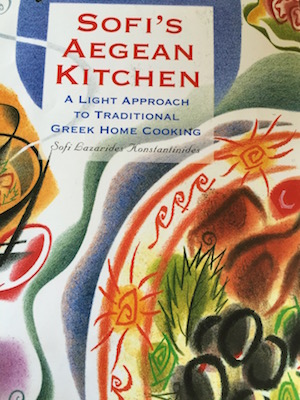
“Defne” was my friend from Turkey. Defne’s name nevertheless is a very popular one in Greece and means “Laurel,” the very same wreath made famous by the ancient Olympic wreath to crown athletic winners. A calm redhead with a definite sense of herself, Defne had always loved things American growing up, TV producer Def oversaw my cooking segments on a local TV show.
So, I cleverly thought, here is a networking match: two young, engaging, food-involved, generous young women from the same part of the world. Both successful in their careers, well-educated, world-traveled and independent. Let’s have dinner together!
And so we wound up at the rustic, dimly lit Four Oaks Restaurant in Beverly Glen one quiet Sunday evening. After pulling me by the sleeve to her side of the table, Sofi ate nothing and stiffly answered questions while Defne and I valiantly made an attempt at small talk and eating. Then the two fought for the check.
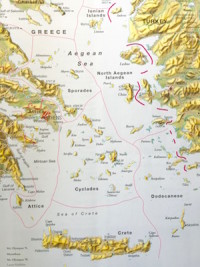 Duh! If I forgot 400 years of bloody Turkish rule in Greece, a tour that following summer of Greek island churches with glass display cases piled high with the bones of adult and young victims massacred by Turkish invaders, was all the reminder I needed.
Duh! If I forgot 400 years of bloody Turkish rule in Greece, a tour that following summer of Greek island churches with glass display cases piled high with the bones of adult and young victims massacred by Turkish invaders, was all the reminder I needed.

Well, eventually Sofi and Defne became friendlier after Defne, always entertaining friends or visiting family, began frequenting Sofi’s, often hosting large parties and sending flowers afterward. After all, most refined Greek cuisine has Turkish roots, a fact I continually have to ignore with my Greek friends.
And that’s lesson number two: in addition to acknowledging what country beat the other in war, it is important to ignore how an oppressed culture incorporates the cuisine of their oppressor. Psychologists, of course, find that victim-oppressor characteristic quite common but it isn’t exactly polite to point that out, and especially not at a dining table.
For example, one of the most popular of Greek dishes is “moussaka.” For starters, the word is Arabic. It arrived on Greek tables by way of Turkish cooks “Basti” dishes from the verb, “to press,” referring to the tightly layered vegetables and meat.
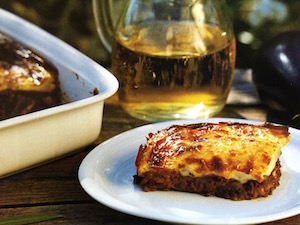 Both Turks and Greeks claim “Dolmas” from the term “hollowing out.” The Turkish version was developed as a part of an elaborate, labor intensive “court cuisine” of the Ottoman Empire before the Greeks claimed it.
Both Turks and Greeks claim “Dolmas” from the term “hollowing out.” The Turkish version was developed as a part of an elaborate, labor intensive “court cuisine” of the Ottoman Empire before the Greeks claimed it.
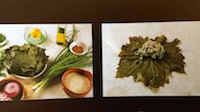 Turkish chefs even use vine leaf wrappers around dishes other than dolmas. One difference is the Turks have always loved vegetables, while for Greeks the opposite held true.
Turkish chefs even use vine leaf wrappers around dishes other than dolmas. One difference is the Turks have always loved vegetables, while for Greeks the opposite held true.
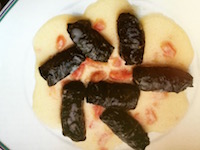 Timeless Tastes, the beautiful, comprehensive book given to me by Layla, Defne’s sister explains how Turkish culinary preparation requires serving dishes hot or cold (not the Greek room temperature) and requires precise measurements in preparation. The photos of the Turkish dishes are from this book.
Timeless Tastes, the beautiful, comprehensive book given to me by Layla, Defne’s sister explains how Turkish culinary preparation requires serving dishes hot or cold (not the Greek room temperature) and requires precise measurements in preparation. The photos of the Turkish dishes are from this book.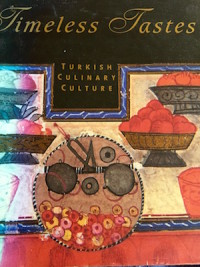
Enormously popular Turkish desserts in Greek cuisine are the varieties of luscious baklava and rice pudding, the Turkish versions being much sweeter in adherence to their principle of “eat sweet, talk sweet.”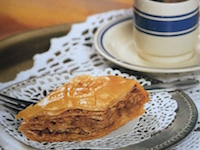
Both cultures, however, have made an art form of drinking their coffee strong. Leyla, Defne’s sister who owned the luxurious restaurant, “S” in Istanbul’s Bebek area reminded us, “in Turkey we have a saying that, “A coffee has a thousand years of remembrance.”
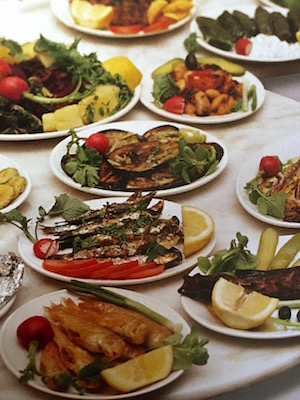 Along with the tradition of dining on an entire meal of “mezes” (small plate appetizers), another commonality is their love of honey, with markets in Turkey offering dozens of different varieties of honey labeled according to the village of origination.
Along with the tradition of dining on an entire meal of “mezes” (small plate appetizers), another commonality is their love of honey, with markets in Turkey offering dozens of different varieties of honey labeled according to the village of origination.
And both Greeks and Turks pay particular attention to where their water “springs” from, specifically the location of the body of water. Perry reports that the Greek penchant dates back to classical times and precedes the Turkish association by centuries!
The list is endless and changing.
But one final note: because they were both in show business and foodies and single, another bright idea of mine was to introduce Defne (Muslim) to Michael (Jewish with Israeli ties). Well, aren’t the Israelis and the Turks friends?
It took Michael a couple of years to appreciate this match but they were subsequently married and became the proud parents of a gorgeous baby boy. And wouldn’t you know? At the “bris” (circumcision ceremony) they served Jewish-American mini hot dogs and handed out Turkish charms to ward off the “evil eye.”



 Gerry Furth-Sides
Gerry Furth-Sides  Barbara Hansen
Barbara Hansen  Chef-owner Alain Cohen
Chef-owner Alain Cohen  Roberta Deen
Roberta Deen  Jose Martinez
Jose Martinez  Nivedita Basu
Nivedita Basu